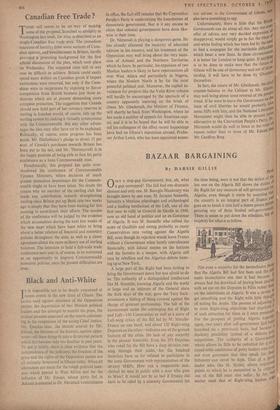Black and Anti-White
TT is impossible not to be deeply concerned at 'recent events in the new State of Ghana. The tactics used against members of the Opposition parties, the deportation of two Moslem political leaders and the attempts to muzzle the press, the evident pressure exercised on the courts culminat- ing in the resignation of the acting Chief Justice, Mr. Quashie-Idun, the threats uttered by Mr. Edusei, the Minister of the Interior, against oppo- nents—all these, things fit into a dictatorial pattern which has become only too familiar in past years. To put it mildly, there is clear evidence that the independence of the judiciary, the freedom of the press and the rights of the Opposition parties are all seriously threatened in Ghana today. When all allowances are made for the rough political man- ners which prevail in West Africa and for the influence of Mr. Edusei, whose party fief in Ashanti is essential to Dr. Nkrumah's continuance in office, the fact still remains that the Convention People's Party is undermining the foundations of democratic government. Nor is it any excuse to claim that colonial governments have done like- wise in their time.
' Dr. Nkrumah is playing a dangerous game. He has already alienated the majority of educated opinion in his country, and his treatment of the Opposition may well bring about the very seces- sion of Ashanti and the Northern Territories which he fears. In particular, his expulsion of two Moslem leaders is likely to have repercussions all over West Africa and particularly in Nigeria, where the Moslem North is by far the most powerful political unit. Moreover, the capital in- vestment for projects like the Volta River scheme will hardly be encouraged by the spectacle of a country apparently teetering on the brink of chaos. Mr. Gbedemah, the Minister of Finance, will shortly be back from Washington, where he has made a number of appeals for American capi- tal, and it is to be hoped that he will be able to tell his colleagues of the effect recent happenings have had on Ghana's reputation abroad. Profes- sor Arthur Lewis, who has been appointed econo-
mal mic adviser to the Government of Ghana, also have something to say. Unfortunately, there is little that the British Government can do about all this. Any too overt, offer of advice, any very decided expression el, disapproval, would simply go to fan the blaze anti-white feeling which has been fed by the nee° to find a scapegoat for the inevitable difficulties which beset a new State. In these circumstances it is better for London to keep quiet. If anYthing, is to be done to make sure that the future Ghana will be one of democracy and not of dicta' torship, it will have to be done by Gha"ia themselves. In fact, the return of Mr. Gbedemah, the chief counter-balance in the Cabinet to Mr. Eclusei: may well bring about some reversal of the pr es trend, If he were to leave the Government c n the issue of civil liberties he would probably tel'e a some MPs with him, and the National Libenon l Movement might then be able to present senle or. alternative to the Convention People's Party. Nkrumah would do well to listen to the N'O Ce t)! aria reason rather than to those of Mr. Edusei Mr. Geoffrey Bing.






















































 Previous page
Previous page